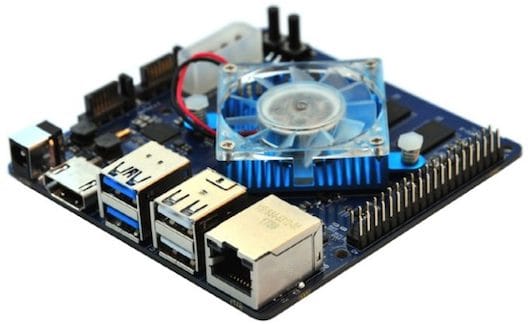
Today I'll tell you about the new *ODROID-N1* that will probably come soon and replace the *XU4*, which still sells quite well. You will be interested to know that **it has the power of a cluster with five Raspberry Pi**...
For me, the three companies that are making the Raspberry Pi Foundation a tough competitor are: *HardKernel* on the one hand with their range of *ODROIDs*, *Shenzhen Xunlong Software CO., which has a lot of versions of *Orange Pi* and *Pine Microsystems Inc.* with relative success thanks to their *Pine64*.
About its most relevant specifications:
Dimensions – 90 x 90 x 20 mm (excluding cooler)
SoC Rockchip RK3399 hexa-core processor with a dual-core Arm Cortex-A72@2GHz, a quad-core Arm Cortex-A53@1.5Ghz, and a Mali-T860MP4 GPU.
eMMC 5.0 (HS400) flash storage, UHS capable micro-SD slot. Native SATA implementation.
Video Output – HDMI 2.0 for 4K display.
4Gb DDR3-1866 RAM.
Connectivity – Gigabit Ethernet port.
USB – 2x USB 3.0 host ports, 2x USB 2.0 host port.
Expansion – 40-Pin GPIO port with GPIOs, I2C, SPI, S/PDIF, PWM, ADC, UART, GND, 3.0V, and 5.0V
Power Supply – 12V/2A (12V/4A adding two 3.5″ HDD).
I read it has the *Samsung Chromebook Plus* specifications that cost $450, for about $110, although they are considering a **lite version with the half of RAM and without SATA for $75**.
It seems that the new *SOC RK3399* will give a lot to talk about, as there are some boards that are mounting it. Some examples: *AAEON RICO-3399 Pico-ITX*, *Firefly-RK3399*, *VideoStrong VS-RD-RK3399*, *Orange Pi RK3399* and *Pine RockPro64* among many others.
As Operating System, It runs *Debian Stretch, Ubuntu 18.04 and Android 7.1*. I miss WiFi support, so much in need today. Works with *Linux 4.4LTS kernel*.
It is expected to go on sale in the second quarter of this year. I'll keep you informed.
Link: [Hardkernel > The Next ODROID!](http://com.odroid.com/sigong/blog/blog_list.php?bid=193)